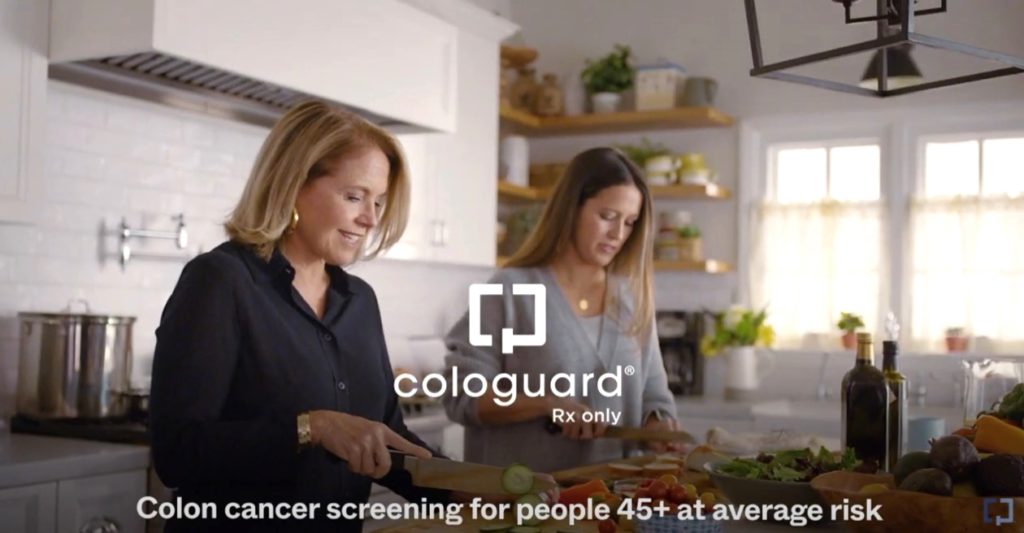Exact Sciences and long-time colon cancer screening advocate and award-winning journalist Katie Couric have teamed up for National Colorectal Cancer Awareness Month this March in a TV ad for the company’s at-home screening test Cologuard.
The ad is part of Exact Sciences’ “Mission to Screen” campaign that was launched this week.
The branded campaign includes a TV commercial (linked in the image above) that features Couric cooking dinner with her 30-year-old daughter Ellie as well as snippets of her conversations with people about their reasons for colon cancer screening.
Couric began championing colon cancer screening after her husband Jay Monahan passed away from the disease in 1998 at age 42. After his passing, Couric got a colonoscopy on air in 2000, which triggered a significant increase in people going in for colon cancer screenings; specialists that perform colonoscopies began to refer to this surge as “the Katie Couric” effect.
A study published in 2003 in Archives of Internal Medicine also wrote about the phenomenon, suggesting that Couric may have inspired many people to get tested for colon cancer, saying “Katie Couric’s televised colon cancer awareness campaign was temporarily associated with an increase in colonoscopy use in two different data sets. This illustrates the possibility that a well-known individual can draw attention and support to worthwhile causes.”
Encouraging early colon cancer screening has become especially important among younger people given the rising rates of colon cancer in this demographic, namely among those 45 to 49 years of age. This also prompted the US Preventive Services Task Force last May to drop the recommended screening age from 50 to 45.
Almost 70 percent of people diagnosed with colon cancer have no family history. Screening is important because many people don’t have symptoms in early-stage colon cancer. If caught in the early stages, colon cancer is treatable in approximately 90 percent of people.
In a press release from Exact Sciences, Couric said, “We lost Jay in the prime of his life. He didn’t get to see his daughters grow up and witness major milestones. That still crushes me.” She explained that she “wanted to prevent other families from experiencing this kind of tragedy and decided to dedicate [herself] to educating people about the life-changing power of screening.”
Exact Sciences says the “Mission to Screen” marketing and social media campaign will run for one year to “educate Americans about the importance of early detection, beginning colon cancer screening at age 45 for average-risk individuals and the availability of multiple screening options.”
“All adults 45 years or older should be screened for colon cancer,” said Kevin Conroy, chairman and CEO of Exact Sciences. “Together with Katie, we’re working to help raise awareness about early detection and the availability of colon cancer screening options, including non-invasive at-home tests like Cologuard. People need to feel empowered to take charge of their own health and wellness and have these discussions about screening with their health care provider, friends and loved ones.”
Cologuard is a non-invasive stool-based DNA screening test approved by the US Food and Drug Administration (FDA) for adults 45 and older who are at average risk for colon cancer. It detects altered DNA and/or blood in stool and finds 92 percent of colon cancers.
It is an easy and convenient test that does not involve any preparation, taking time off work or any changes to the diet or medication.
Cologuard was launched in 2014 and since then, almost 8 million people have used it to screen for colon cancer. Once prescribed by a health care professional, it is delivered to an individual’s home and also picked up once they have completed the test.
Although colonoscopy remains the gold standard test for colon cancer, doctors deem stool DNA tests as an acceptable alternative for people at average risk who may be hesitant to get the more invasive procedure.
Cologuard is covered by most health insurance plans and almost 94 percent of all Americans don’t have any out-of-pocket costs for Cologuard, according to Exact Sciences.
At-home screening options became even more important during the COVID-19 pandemic. Exact Sciences says an estimated 1.7 million colonoscopies were missed in a three-month period ending June 5, 2020, because many Americans opted to forgo their regular screenings due to the pandemic.
Couric said she sees the new campaign as a continuation of the work she began years ago.
“I’m touched by all the people who stop me in the street and say, ‘I got screened because of you,’ ” Couric said. “Now, with more people eligible and more options than ever, the time is right to help a new generation of Americans get screened.”
Exact Sciences is eyeing an FDA approval for a newer version of its test, Cologuard 2.0, which was developed to improve the accuracy of the existing test and also help detect precancerous polyps. The latest data from a pivotal trial evaluating the second generation Cologuard test showed improved accuracy of 92 percent, high sensitivity of 95 percent and precancerous lesion sensitivity of 57 percent. Additional results from the trial are expected in late 2022 or early 2023.












Join or login to leave a comment
JOIN LOGIN